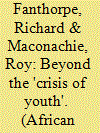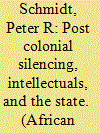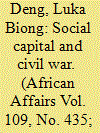|
|
|
Sort Order |
|
|
|
Items / Page
|
|
|
|
|
|
|
| Srl | Item |
| 1 |
ID:
094926


|
|
|
|
|
| Publication |
2010.
|
| Summary/Abstract |
Sierra Leone's conflict has often been characterized as a 'crisis of youth'. For some, the post-war resurgence of grassroots associational life represents the unleashing of long-suppressed youth egalitarianism, yet this analysis tends to ignore the role of international aid in providing an economic incentive for impoverished Sierra Leoneans to embrace formal association. Case study evidence also shows that politics of 'community' identification and moral economies of patronage continue to affect post-war aid. Evidence of post-war social change can nevertheless be found outside the development sector. Diamond mining has long served as a driver of cultural modernization in Sierra Leone and detailed examination of post-war associational life in Kono District reveals that new foci and techniques of social activism have emerged since the end of the civil war. The decline of artisanal mining, with the expansion of large-scale industrial mining, and renewed interest in farming are driving a parallel resurgence of associational life in rural areas. Given that most Sierra Leoneans continue to depend on farming, this rural resurgence could yet represent the most durable basis for democratic change in Sierra Leone.
|
|
|
|
|
|
|
|
|
|
|
|
|
|
|
|
| 2 |
ID:
094923


|
|
|
|
|
| Publication |
2010.
|
| Summary/Abstract |
In May 2008, South Africa witnessed two shocking weeks of deadly attacks on foreigners and other suspect outsiders. This article makes sense of the violence with reference to an extended history of South African statecraft that both induced the conflict and hamstrung efforts to address it. In particular, it describes how decades of discursive and institutional efforts to control political and physical space have generated two demons with which the country must now contend. The first is a perceived enemy within: an amorphously delimited group of outsiders that is inherently threatening, often indistinguishable from others, and effectively impossible to exclude spatially. The second demon rests in a society prepared to kill to rid itself of those retarding the country's post-Apartheid renaissance. For many of those behind the attacks or empathizing with them, controlling the movement of people within the country and across its borders remains essential to security, prosperity, and South Africa's national self-realization. Political leaders now face a dilemma: extending legal identities and constitutionally promised protections to outsiders and other foreigners risks being seen as betraying the national project by the demonic and visibly violent society they have helped create
|
|
|
|
|
|
|
|
|
|
|
|
|
|
|
|
| 3 |
ID:
094927


|
|
|
|
|
| Publication |
2010.
|
| Summary/Abstract |
This article analyses over 400 life trajectories of ordinary peasants in order to complement top-down studies of the Rwandan political transition. Changes and differences according to the ethnicity of the respondents shed light on the Hutu-Tutsi bi-polarity which underlies the transition and reveal a reversal in perceived ethnic dominance accompanying the decisive moment in the political transition: the overthrow of the Hutu-dominated regime by the Tutsi-led RPF. This suggests that the experience of the nature of governance and the (perceived) proximity to power lies at the heart of ethnic awareness. The nature of governance at the periphery of society is explored, and the article demonstrates that the instrumental stance on ethnic identity adopted by the post-genocide regime is not only erroneous but counter-productive. Adjusting the socio-political environment in which identities thrive is more important than a direct focus on identity constructs when developing policies to prevent ethnically structured violence.
|
|
|
|
|
|
|
|
|
|
|
|
|
|
|
|
| 4 |
ID:
094929


|
|
|
|
|
| Publication |
2010.
|
| Summary/Abstract |
In the immediate post-liberation period, Eritrean intellectuals, with the concurrence of the state, showed deep interest in developing archaeological studies and an enhanced capacity to manage heritage resources. Through a focus on the National Museum, this article investigates the ensuing struggles for the control of history and heritage in Eritrea. Originally an initiative of ex-fighters who rendered liberation history in artistic form, the National Museum later came under the authority of the University of Asmara. While other museums involving those who survived displacement and conflict, such as the District Six Museum in Cape Town, often contest the expert authority of intellectuals and invite public participation, the National Museum became an instrument of the state that suppressed public participation. The struggle between the National Museum and the University provides penetrating insights into state hostility towards intellectuals and containment of public education using the media of archaeology and heritage studies, a conflict that prefigured state/university conflicts leading to the dismantling of the University of Asmara.
|
|
|
|
|
|
|
|
|
|
|
|
|
|
|
|
| 5 |
ID:
094924


|
|
|
|
|
| Publication |
2010.
|
| Summary/Abstract |
It is generally assumed that violent conflict has a negative effect on social capital, and war zones are considered to be 'zones of social capital deficiency'. This article challenges this position, and attempts to develop a more nuanced understanding of the status of social capital in the context of Sudan's civil war. The empirical findings clearly question any simplistic assumption that conflict erodes social capital. While it is true that certain types of social capital have been a casualty of civil war, the opposite is the case in other communities. The article explains this difference by drawing a distinction between 'endogenous' and 'exogenous' counter-insurgency warfare. Communities in southern Sudan that were exposed to endogenous counter-insurgency warfare experienced a loss of social capital, but where exogenous violence dominated, there has been a deepening and strengthening of bonding social capital among and within communities.
|
|
|
|
|
|
|
|
|
|
|
|
|
|
|
|
| 6 |
ID:
094922


|
|
|
|
|
| Publication |
2010.
|
| Summary/Abstract |
This article explores the history of elections by secret ballot in Sudan since the 1950s, and considers what lessons this history may offer in the run-up to the national elections planned under the Comprehensive Peace Agreement. The article locates the repeated use of the secret ballot in Sudan in the context of a wider state-directed project of modernity, for which the secret ballot offers a performative enactment of the relationship between an efficient state and a disciplined citizenry. The article therefore focuses on the actual procedure of elections, rather than on high politics, and it argues that despite a formal insistence on consistent procedure, practice often deviated from the supposed rules. While in some cases such deviations were driven by political manipulation, they were at other times simply the result of a lack of resources; such deviations were covered up by officials who were well aware of the immense value placed on the performance of the secret ballot. It seems likely that the coming elections will see similar problems and deviations from the rules, and that the elections are unlikely to achieve the intended aim of developing a more inclusive political culture.
|
|
|
|
|
|
|
|
|
|
|
|
|
|
|
|
|
|
|
|
|